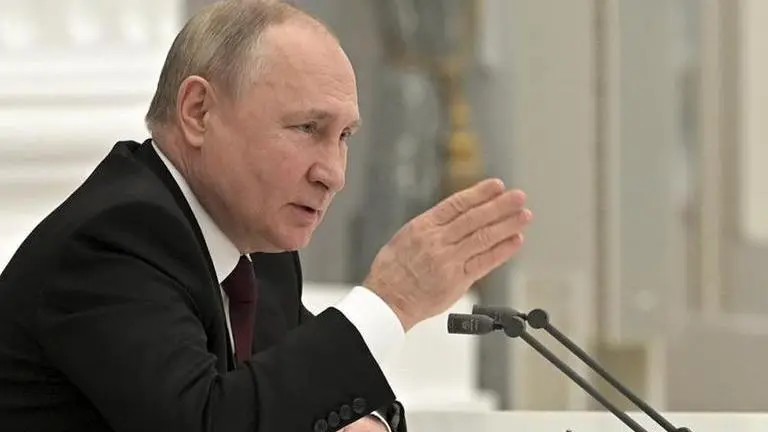Updated 22 February 2022 at 01:25 IST
Russia recognises ex-Ukraine Donetsk & Luhansk; France & Germany voice resentment
Amid the looming fear of invasion, Russian President Vladimir Putin will address the nation soon, news agency Sputnik reported on Monday.
- World News
- 4 min read

Russian President Vladimir Putin, on Monday, signed a decree recognizing the independence of breakaway regions Donetsk and Luhansk. This come after the President made a televised address to Russians on Monday. Earlier in the day, Putin held a phone call with his French counterpart Emmanuel Macron and German chancellor Olaf Scholz and stated that he will be signing a decree recognizing the independence of Donetsk and Luhansk. According to the statement released by Kremlin, both the French and German leaders voiced dissatisfaction on hearing Putin's decision.
"Today, the leadership of the DPR (Donetsk People's Republic) and LPR (Luhansk People's Republic) received appeals to recognize their sovereignty in connection with the military aggression of the Ukrainian authorities, massive shelling of the territory of Donbas, as a result of which the civilian population suffers. With all this in mind, the President of Russia said that he intended to sign a relevant decree in the near future," read the statement released by the Kremlin on Monday.
The statement further noted, "The President of France and the Federal Chancellor of Germany expressed their disappointment with this development. At the same time, they indicated their readiness to continue contacts." According to news agency Sputnik, the Russian President will address the nation soon. Citing Kremlin spokesman Dmitry Peskov, the news agency reported that he has confirmed the media reports and added "Mr President is expected to make a televised address very soon." Notably, the confirmation from the Kremlin spokesperson came hours after the Russian President held an extensive meeting of the Russian Security Council on the issue of whether to recognise the independence of separatist regions (DPR and LPR) in eastern Ukraine.
It is pertinent to mention here that Putin decided on the matter of recognition despite West's repetitive warnings and speculations that Moscow could use as a pretext for an attack on Kyiv. According to the United States, Russian troops assembled on frontiers of Ukraine and POTUS Joe Biden even announced that Mr Putin has already decided to harm his neighbouring country, Ukraine. Yet, the American and Russian presidents tentatively agreed to a possible meeting in a last-ditch effort to avert war.
Advertisement
Ukraine’s Zelenskyy calls Russia's Putin to meet and seek resolution to avert war
"We can even provide you with a list."
— Munich Security Conference (@MunSecConf) February 19, 2022
President @ZelenskyyUa says there is a lot the international community can do to support #Ukraine in the face of threats from #Russia. #MSC2022 pic.twitter.com/Y4XvgqNqzY
Ukrainian President Volodymyr Zelenskyy on Saturday called his Russian counterpart Putin to meet him and seek a resolution to avert the crisis. The statement from Zelenskyy came during the Munich Security Conference that also had in attendance several western leaders including US Vice President Kamala Harris and United States Secretary of State, Antony Blinken. “I don’t know what the president of the Russian Federation wants, so I am proposing a meeting. Russia can pick the location for the talks," said Zelenskyy during the conference. "Ukraine will continue to follow only the diplomatic path for the sake of a peaceful settlement," the Ukrainian President further added.
Notably, on Saturday, separatist leaders in eastern Ukraine ordered a full military mobilization despite a frequent warning from the Western leaders of invoking stringent sanctions-- both politically and economically. At the time of writing this article, there was no immediate response from Kremlin over the Ukrainian President's proposal. It is pertinent to mention here that the battle between Ukraine's government and the breakaway Donetsk and, Lugansk Republics is not new. It has been going on since 2014. In a bid to control the violence in the Donbas region, an accord called the Minsk agreement was signed in February 2015. The deal came after tough negotiations among leaders of France, Germany, Russia, and Ukraine — the Normandy group. However, the agreement did not exhibit the desired result, and, it is visible only in the papers, resulting in frequent sporadic clashes.
Advertisement
(With inputs from AP)
(Image: AP)
Published By : Ajeet Kumar
Published On: 22 February 2022 at 00:28 IST

